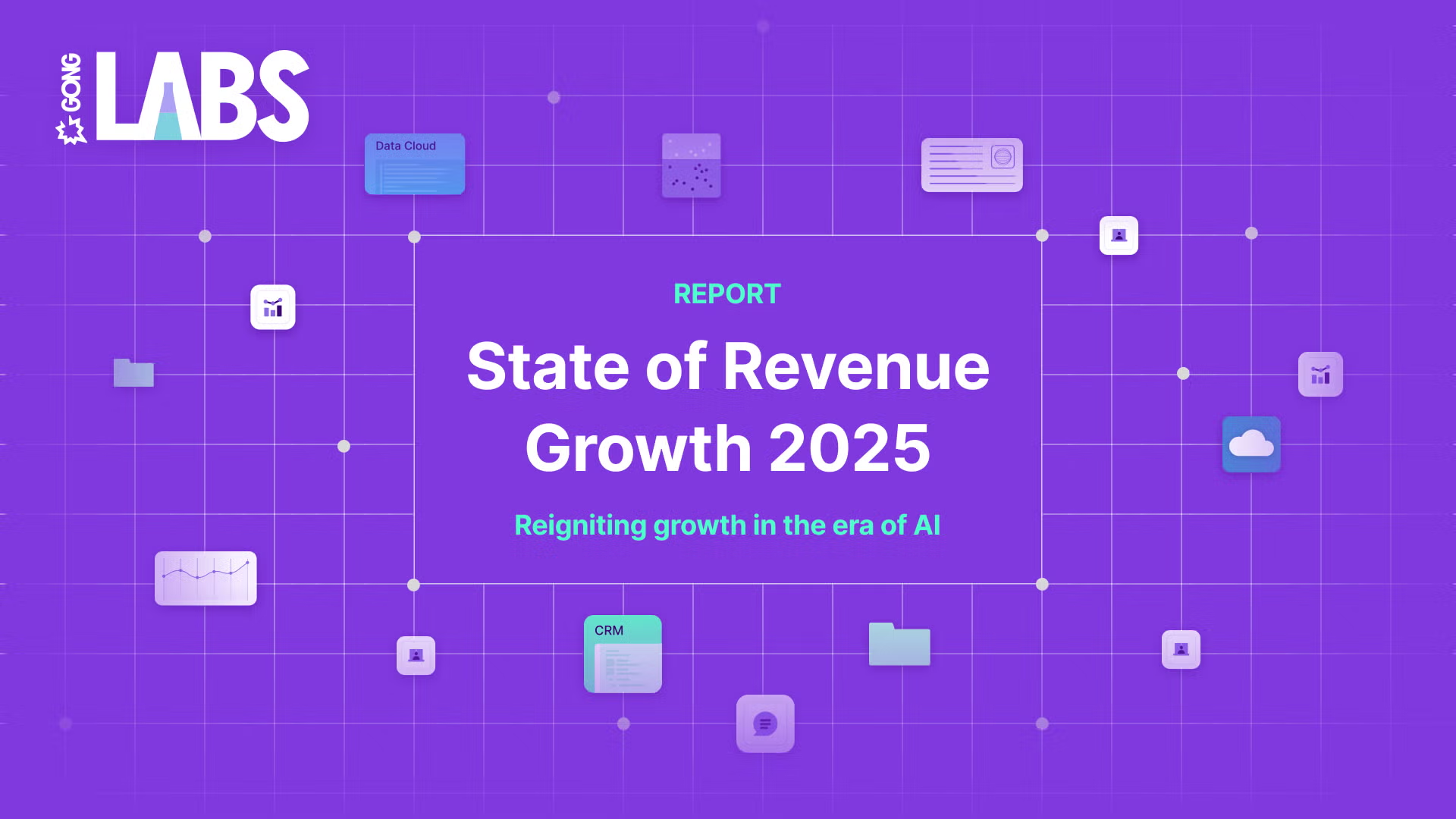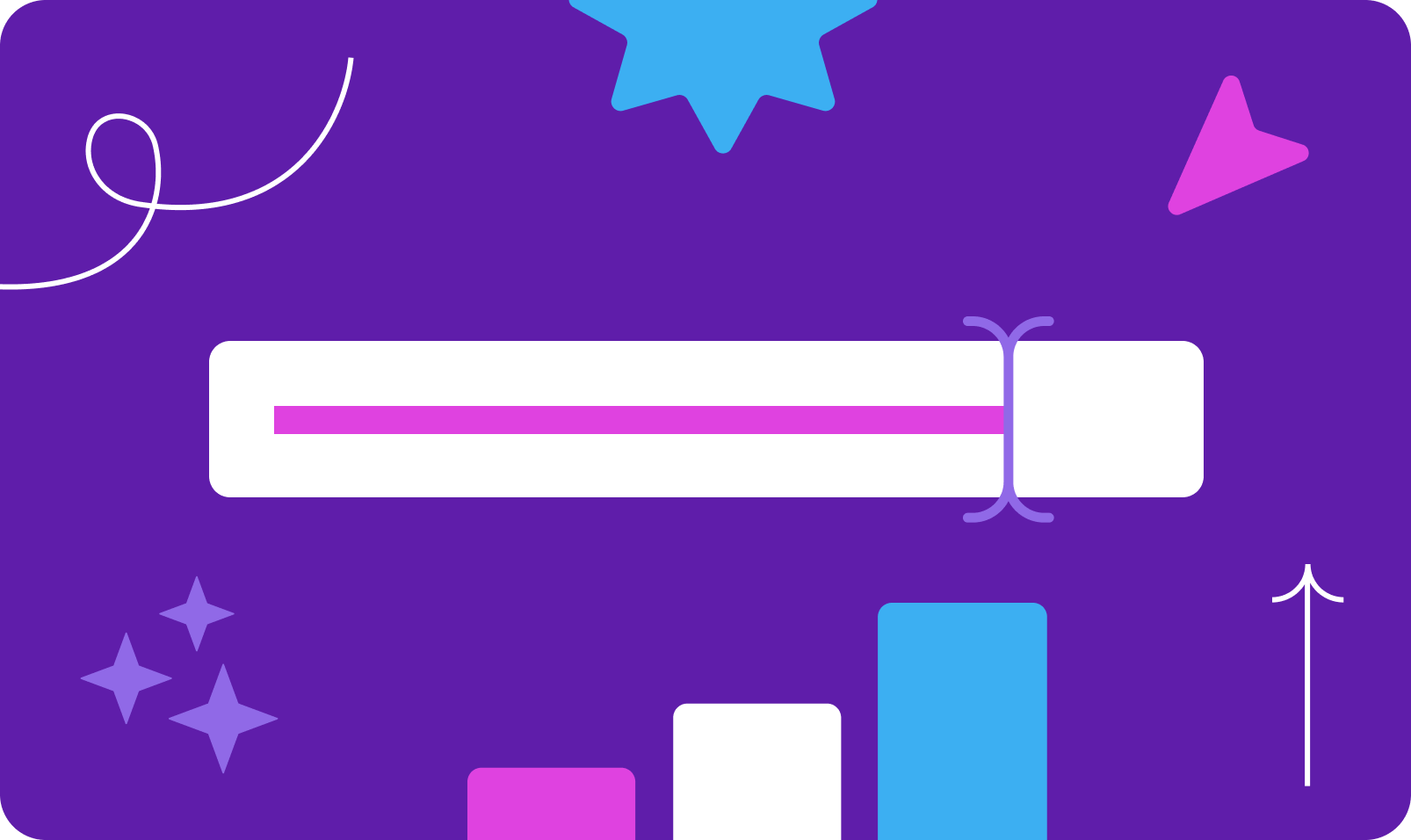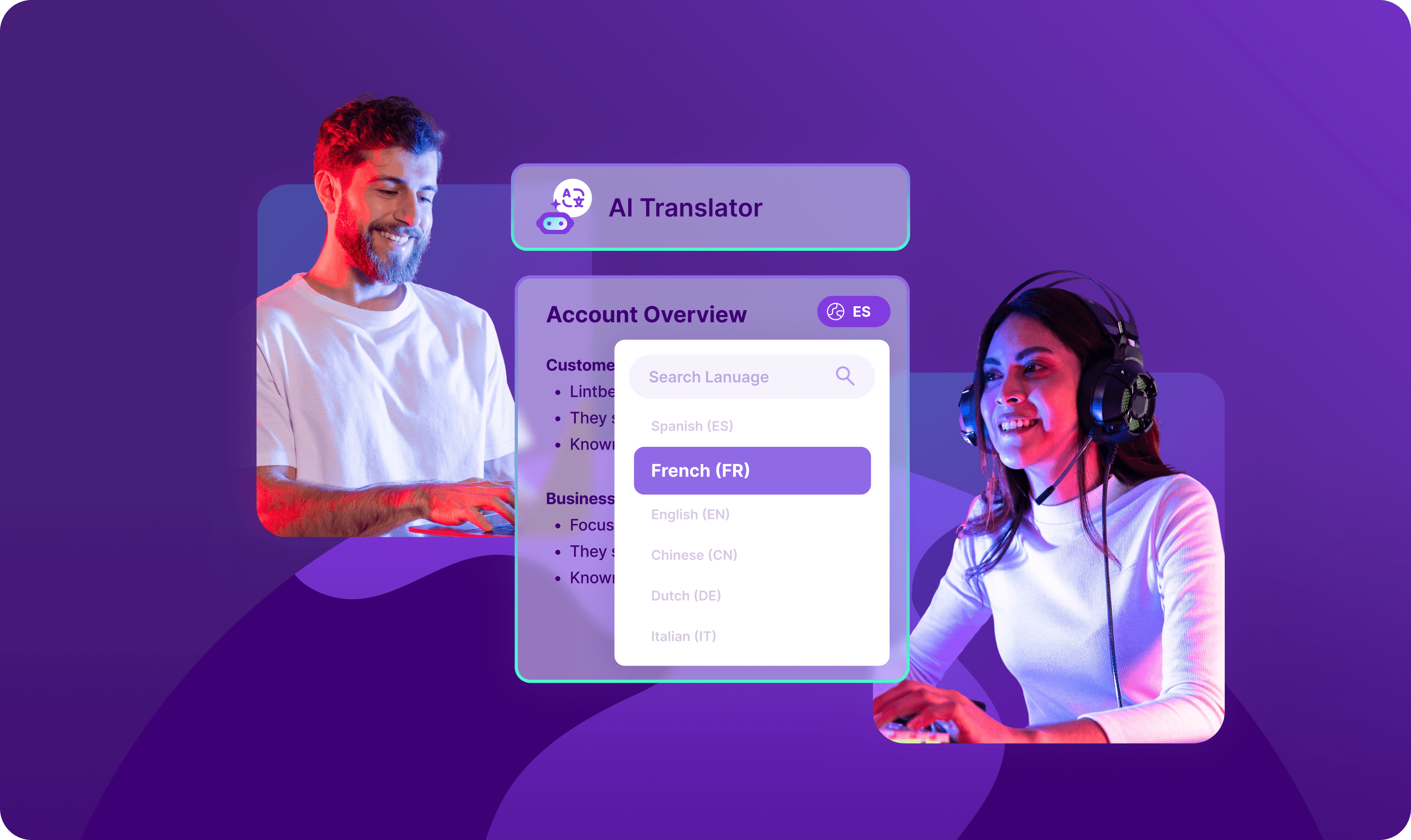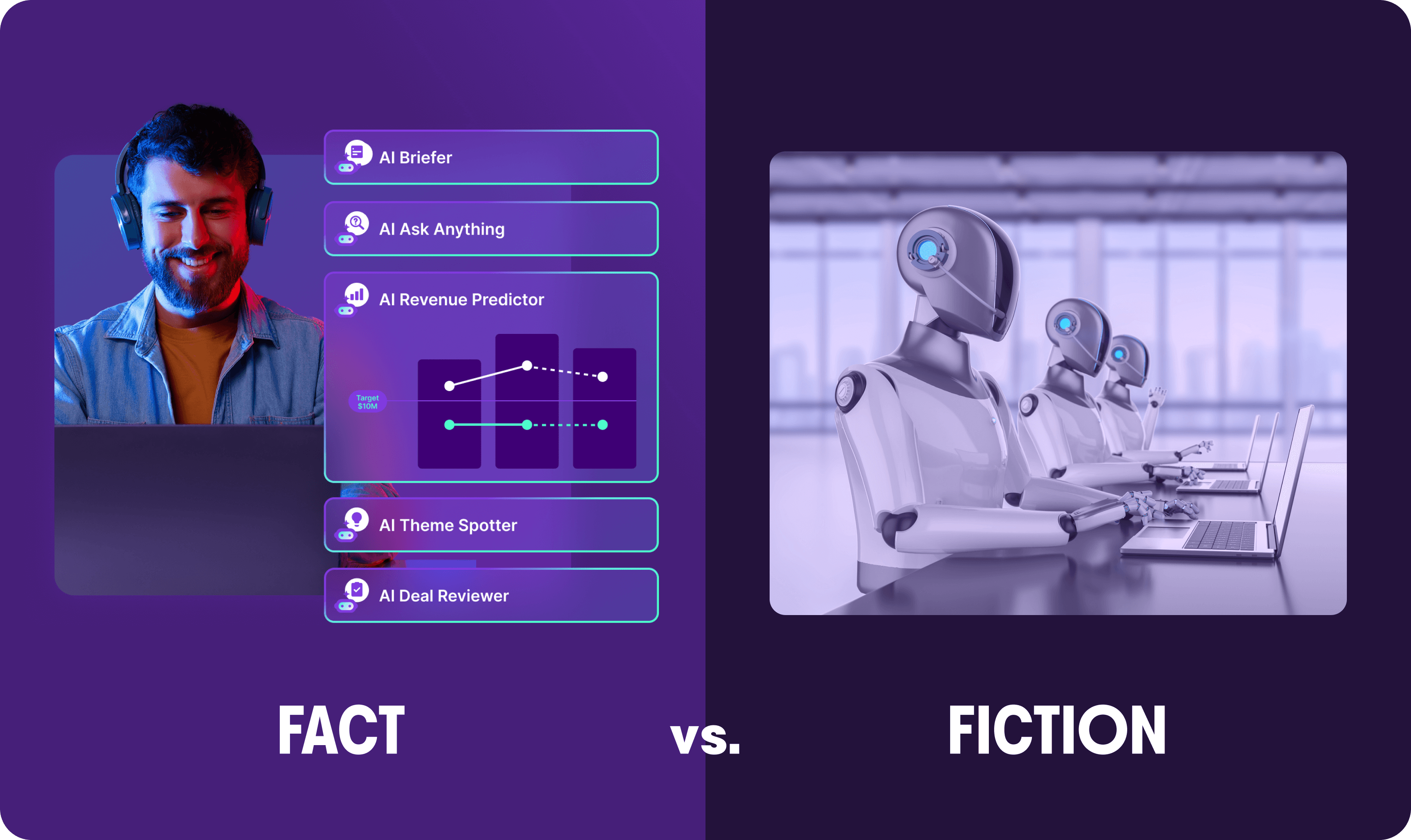Sales engagement
Use 6 proven follow-up email strategies to accelerate your sales

Jonathan Costet
Content Author
Published on: August 30, 2021
I used to hate the waiting game.
Refreshing my inbox.
Checking phone notifications.
Hoping for a sign of life –anythingto know my deal was still on track.
That was before I leveled up my email follow up game (no following up, circling back, or touching base).
These 6 sales follow up emails are everything you need to go from hoping it will close to controlling the conversation so you can speed up your deal.
All based on actual cold email stats .
Even if you only copy one of these follow up emails, you’ll see deals open up and sprint towards signature.
I mean, what’s the alternative? Waiting it out?
Follow Up Email #1: Cold Outreach
You fired off your first email.
No response. Nothing.
Then a follow up email (#2). Then #3. Then … #4?
Still no email back.
All you need is to confirm there is interest. Some interest. Any interest. You want to know there is a chance.
Here’s how to get a reply:
Break down your ask into simple terms.
Instead of trying to get that one BIG, huge, overwhelming yes (i.e., “Yes, I’ll take a meeting with you.”), use this opportunity to get as many “little yesses” as possible.
“Yes, I’m interested.” “Yes, I’ll answer.” “Yes. I’ll give you some information.” “Yes, I’ll listen to what you have to say.”
This leads to, “Yes, I’ll take a meeting.”
Here is what that follow up email looks like:
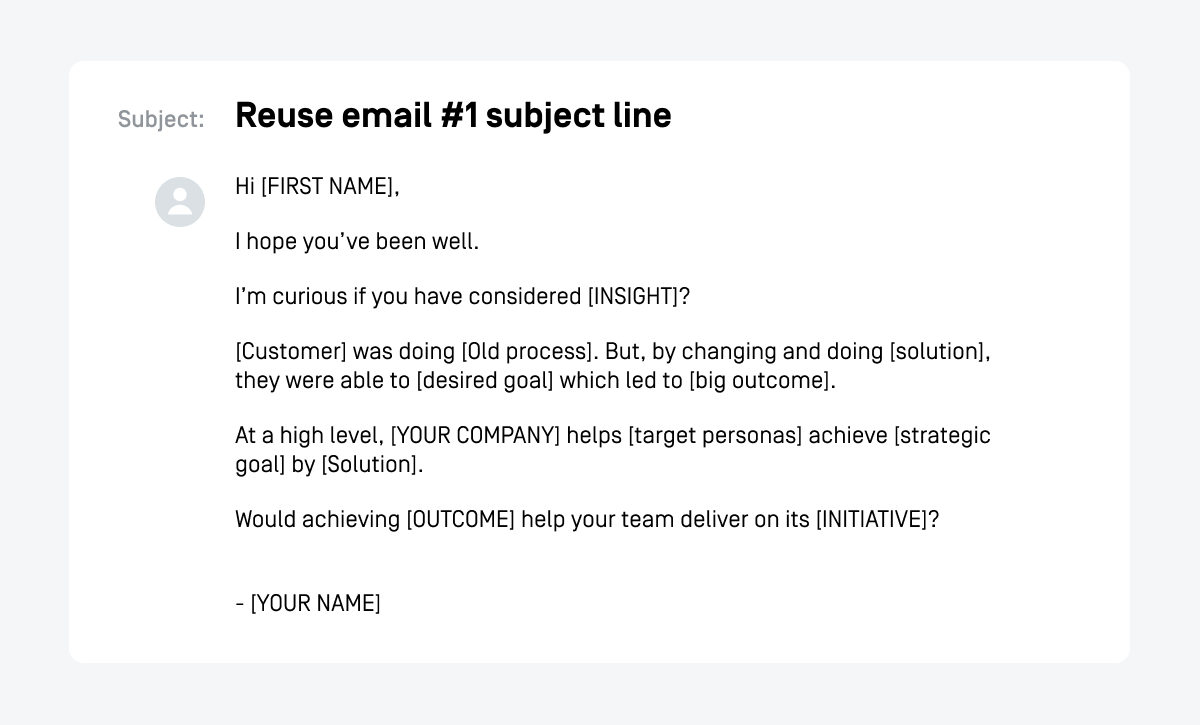
Why it works:
First off, it’s long – and longer emails perform 15X BETTER for cold outreach follow up .
Second, check out the CTA.
This email follow up example isn’t asking for time or a meeting, it’s asking forinterest.
This reflects a new and highly effective approach to prospecting: selling the conversation, not the meeting.
And the data proves that this strategy is TWICE as effective for cold emails.
Ready to start writing “too good to ignore” cold emails? Download these 7 irresistible cold email templates and build more pipeline with less emails..
Follow Up Email #2: No-Show
They answered your email. They agreed to take a meeting.
You continued to “move them down the sales funnel” during that first meeting and landed yourself a demo. You were even able to lock in that sales call with a calendar invite — one they quickly accepted.
Hard work, done!
Life is good.
You are cruising towards closed-won.
Until…Poof.
No show.
You need to get back on their radar (and get that demo rescheduled) ASAP. You need an answer — interested or not, you need to move forward with (a) a demo or (b) cut and run so you can prioritize the proper accounts.
Don’t underestimate the degree of permission you’re granted when responding to a request for information about your product!
Asking — and asking again via a follow-up email — is NOT an intrusion. You are not bothering them. You are not “taking their time.”
You’re just thorough.
In your follow-up email, be clear that they were interested and that you can give them what they requested.
Here’s an example to get your imagination running:
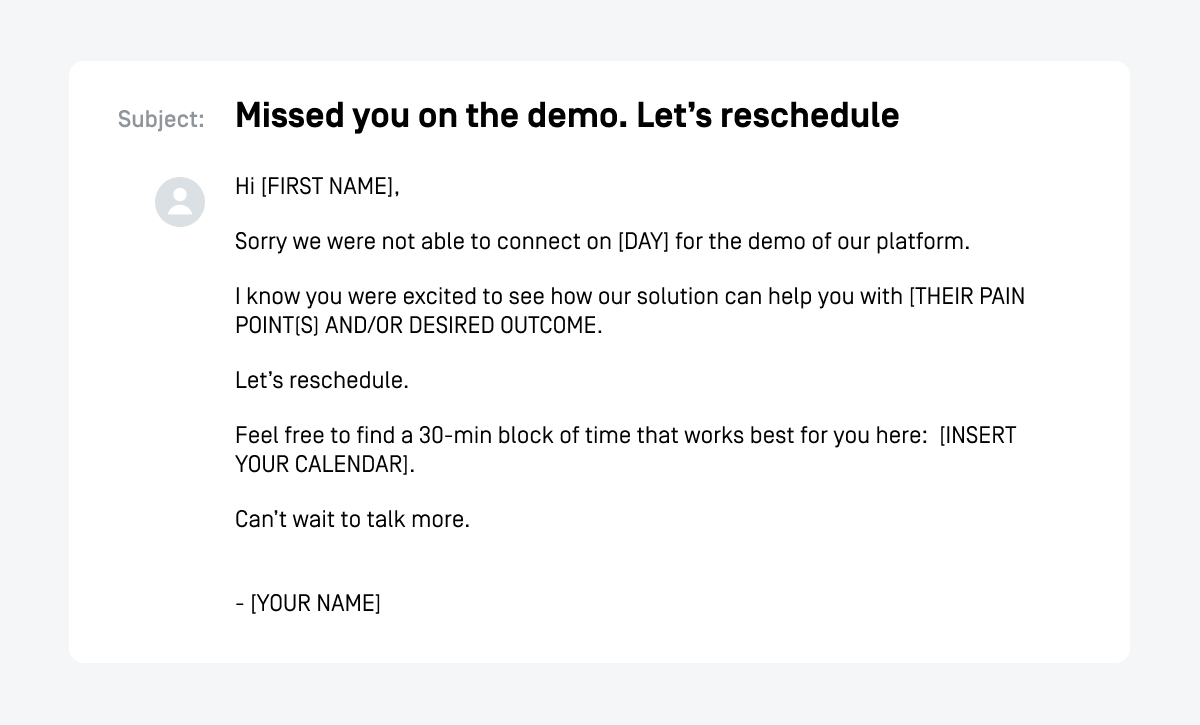
Follow Up Email #3: Post-Call
You just finished giving a demo.
Before you forget everything ( not an issue if you record calls ), it’s time to draft up your demo call follow up email.
To ensure you (continue to) knock it out of the park and keep your deal moving forward, you must capitalize on their interest to move into next steps (which you set during your meeting, riiiiight?).
What information did they request? What items need to be checked internally? What is coming up next to keep the deal moving?
Lots of questions to consider. Thankfully, you have all the answers!
Here’s how it’s done:
- Personalize! Personalize! Personalize!This is not the time for a mass email. It’s not the place for robot-like communication. Send one email per participant — you are much more likely to get a response to an individual email than in a group email. Call out important sections of your email to specific participants and point out next steps that they agreed to take in the call.
- Use compelling events to create urgency.Remind them of their timeline. To be clear, their timeline, not your timeline. Create that sense of urgency: “As we discussed, you wanted to have something in place before the new fiscal year.” This helps the buyer recall why it’s essential to take action … soon.
- Discuss next steps. Remember, discussing the next steps is good for deals .
Here is what that follow up email could look like. Use it as an example after your next sales call:
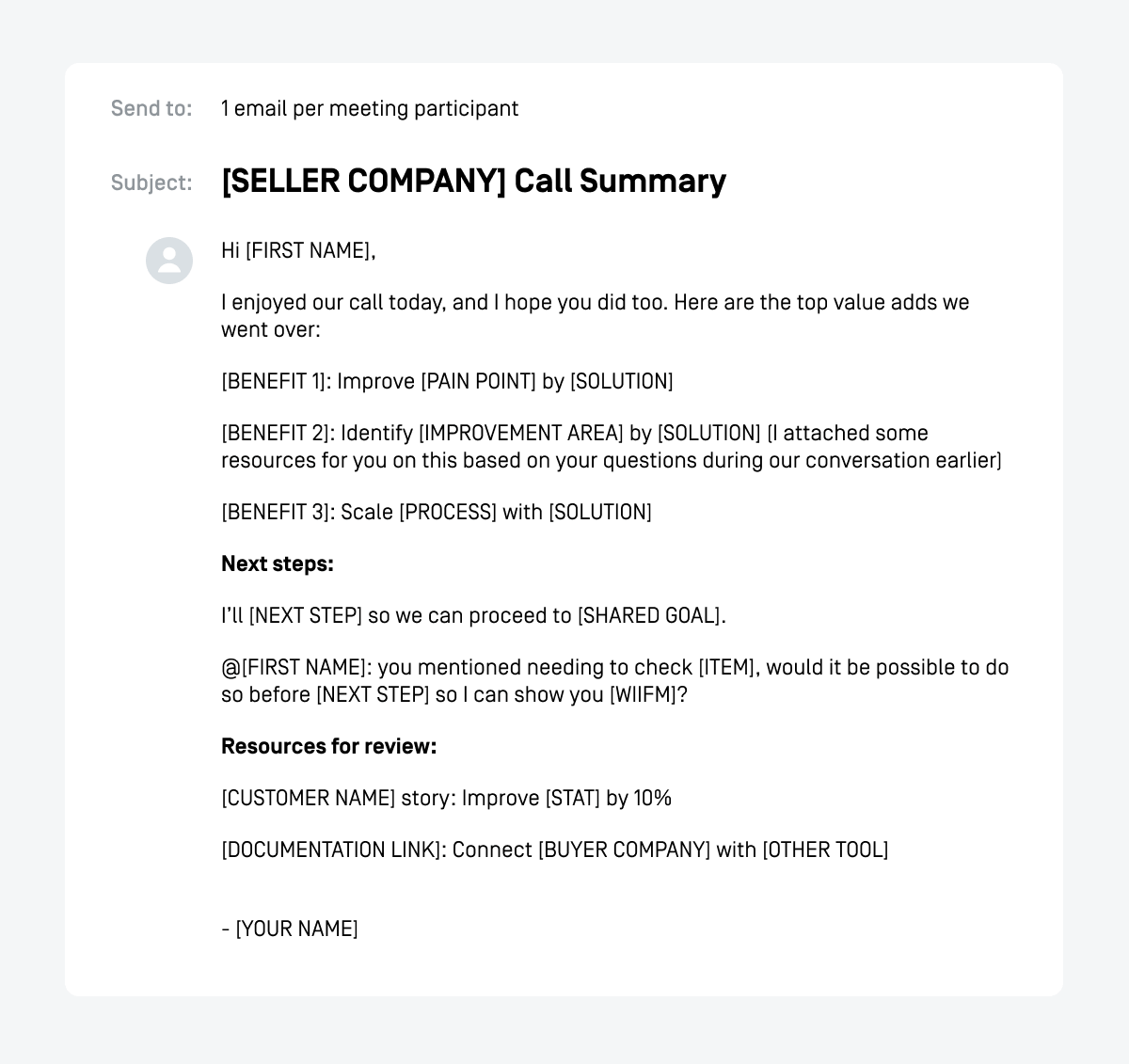
For maximum impact: single-thread your follow up.
Keep the body the same, but send it out individually and call out specific resources or next steps that pertain to each meeting participant.
P.S: Getting writer’s block with your sales emails? These 11 hyper-persuasive sales email templates have you covered from cold outreach to closed-won.

Follow Up Email #4: Loop In The Decision Maker
You are prepping for that C-suite call.
This is the big one. You are inching closer to the close.
You were in touch with the decision maker (DM) at the start of the deal. Now it’s time to loop them back in.
You need to get the DM caught up, back in the game. You need to help them understand where the deal stands and set clear expectations, so they can step into the meeting and move the deal forward (not set it back).
Here’s how it’s done: Speak to their level. Make it crystal clear this call – the one you are requesting they take —will address their main priorities.
Here is a follow up email example to get meetings on the calendar with busy execs:
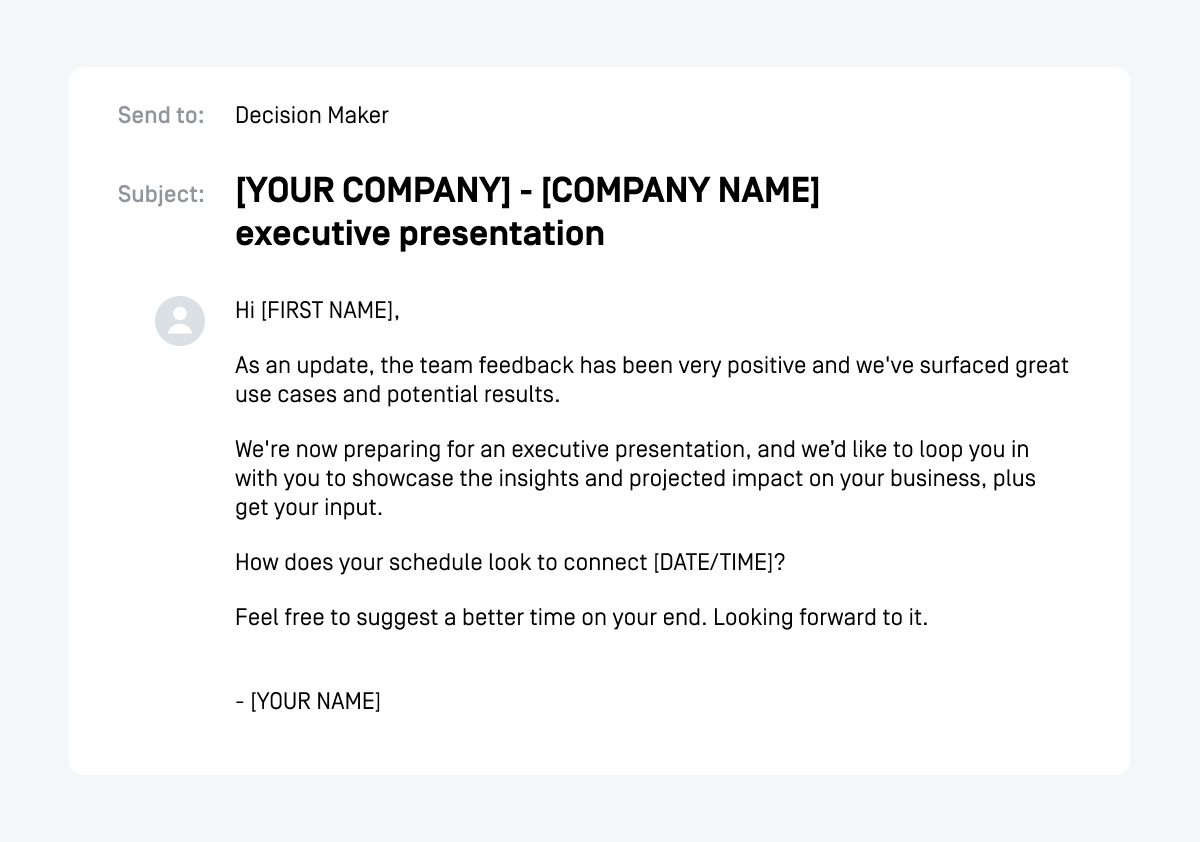
Not inspired? Looking for a good first line to start your email?
Quick: Check out these sales email examples and use tried and tested recipes to close more deals from your inbox.
Follow Up Email #5: The Proposal
You are in the homestretch. The i’s need some dotting. The t’s need some crossing.
Verbal agreement: Check. Budget: Approved. Timeline: Locked in.
You just need the signature. The (sometimes) elusive signature.
The clock is ticking. Your manager is breathing down your neck, looking for a status update. You need to know ASAP if you still have a deal.
It’s time to use your influence to speed up the conversation.
Here’s how to get it: Turn to your champion and ask for time with the decision maker.
To be blunt: You’ve sent the sales proposal over. What gives? What’s the hold up? You need to know. Now.
It’s time to send an email.
Here’s a follow up example for you tostealget inspired:
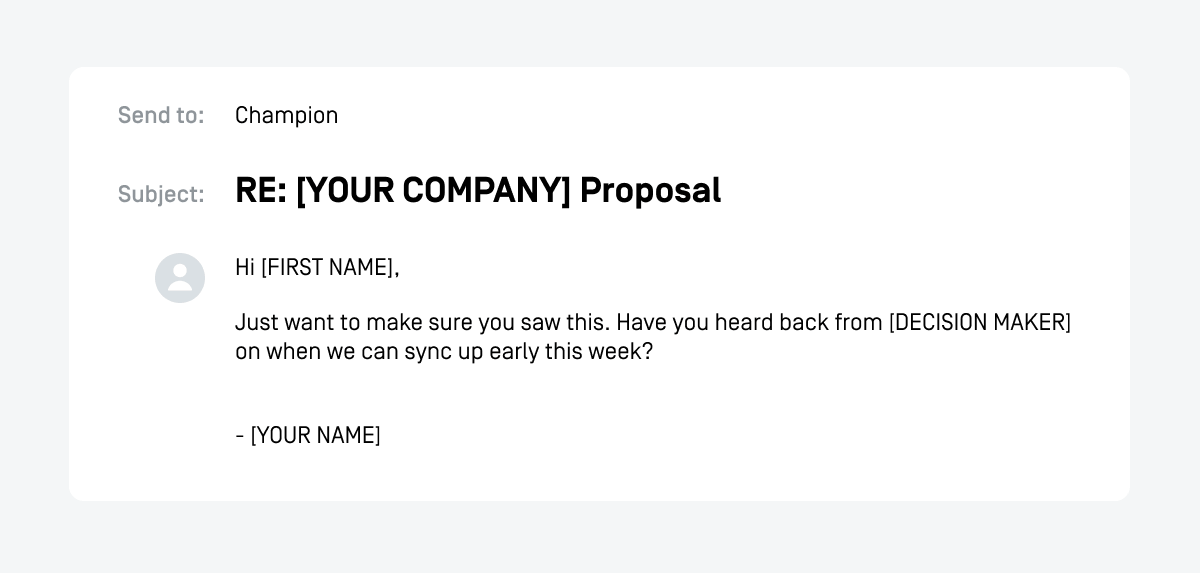
Follow Up #6: Referral Play
And … you did it.
Signed. Sealed. Delivered. Closed-won.
Everyone is happy.
The easy thing to do is pat yourself on the back and take some time to celebrate. But as we know, top reps celebrate success and then get back to the hunt.
With just a touch more effort — a well-timed referral email — you can add one (or more) scorching hot leads to your pipeline. The time is ripe to “touch base” with your new favorite customer and ask for a favor.
Asking for referrals is one of the most powerful ways to build pipeline. Good people know good people: If done right, you’ll get intros to folks who are just like your existing customers.
There’s nothing quite like a warm recommendation from a happy customer.
How it’s done: You already have rapport – use it! Explain why you’re reaching out. Make it clear it’s because they’ve seen success from your product or service. And make it actionable: Who are they introducing you to? Where?
So there you have it, follow up email example #6:
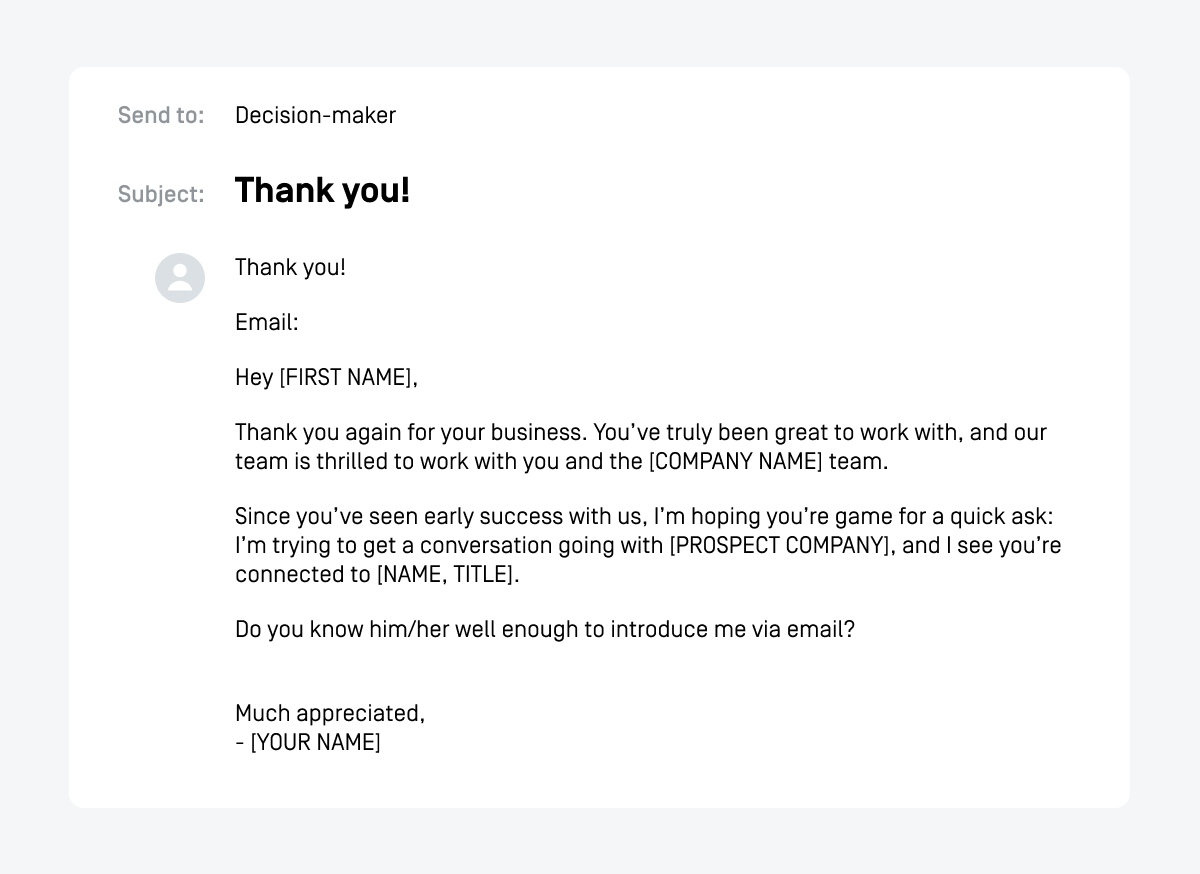
The Best Reps Send The Best Emails
Prospecting emails. Multi-threading emails. Negotiating emails. Closing emails.
We’ve got ‘em all.
These sales email templates have you covered throughout the entire sales cycle.
Get the 11 hyper-persuasive sales template emails : fill-in-the-blanks to close more deals from your inbox.


Content Author
Jonathan Costet is the Senior Director of Revenue Marketing at Wiz. Before this, he was Senior Manager, Growth Marketing at Gong, where he played a crucial role in driving demand generation through data-driven strategies. At Gong, Jonathan harnessed the power of revenue intelligence to craft effective messaging, improve customer retention, and optimize sales forecasting. He was instrumental in using Gong's platform to unlock insights that helped target the right buyers and maximize marketing efficiency.
Discover more from Gong
Check out the latest product information, executive insights, and selling tips and tricks, all on the Gong blog.
